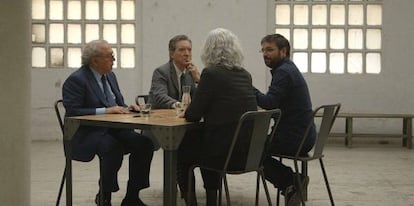Fake coup documentary sparks row
La Sexta’s mockumentary ‘Operación Palace’ sets social networks alight

A fake documentary about the February 23, 1981 (23-F) attempted coup d’état in Spain broke viewing records and caused a huge stir on the social networks on Sunday night.
The brainchild of satirist Jordi Évole, presenter of La Sexta’s popular Salvados investigation show, Operación Palace featured prominent figures from politics and the media providing, in perfect sync, invented testimony relating to the events surrounding the 1981 attempted coup, in which a group of civil guards, led by Lieutenant-Colonel Antonio Tejero, violently stormed Congress.
The program followed in the vein of French filmmaker William Karel’s 2002 mockumentary Dark Side of the Moon, which used convincingly edited archive footage of figures such as Donald Rumsfeld and Henry Kissinger, and interviews with the likes of Buzz Aldrin and the widow of Stanley Kubrick, to suggest that the 1969 Moon landings were faked by the US government with the help of the master filmmaker.
But whereas the participants in Karel’s movie had no idea that what they were saying would be made into an outrageous montage, in Operación Palace the talking heads followed the script to the last detail.
The “experiment,” was supported using fake declassified CIA documents
Évole revealed the hoax at the end of the broadcast, which was watched by 5.2 million people, representing an audience share of 23.9 percent. The figure broke Évole’s own previous record for this season set by the Salvados episode featuring a debate between Catalan premier Artur Mas and former Socialist Prime Minister Felipe González, which attracted 4.09 million viewers.
La Sexta trailed the special show to viewers with a touch of mystery: “Can a lie explain a truth?” The press release sent out to the media ahead of the program explained that it featured testimony from some of the leading players in 23-F, recalling a historical moment that had the country on tenterhooks. “We are going to broadcast a program about 23-F, but it will not be just another documentary about the date, it is something else,” it stated.
The “experiment,” as Évole himself described it, was supported using fake declassified documents from the CIA, which revealed details of a meeting of political leaders at the Palace Hotel in Madrid where the ruling government of then-Prime Minster Adolfo Suárez planned a fake coup d’état that would preempt the 23-F coup. Lending apparent credibility to the story were the meticulously delivered testimonies of politicians such as former Socialist Madrid regional premier Joaquín Leguina, ex-Education Minister Federico Mayor Zaragoza, Basque Nationalist Party politician Iñaki Anasagasti, academic and former Alianza Popular secretary-general Jorge Verstrynge and ex-Communist Party secretary-general Felipe Alcaraz, as well as journalists such as Iñaki Gabilondo, the-then head of news at state broadcaster TVE, and Fernando Ónega, the former news chief at the Cadena Ser radio network. The film also featured Oscar-winning filmmaker José Luis Garcí, who was supposedly responsible for creating the footage of the attack on Congress.
At the end of the broadcast, Évole apologized for the deceit and moderated a serious debate between Gabilondo; Garbiñe Biurrun, president of the social division of the Basque Country Regional High Court; and former Defense Minister Eduardo Serra.
“I’d understand if the people who believed it wanted to set me on fire,” Gabilondo said afterwards, a statement that preempted the tide of comments that was about to be unleashed on the social networks. Messages both favorable and furious inundated Twitter: “I completely swallowed it... Wow,” said Inés Sabanés of ecological party Equo.
Participant Alcaraz said there was an element of truth in Operación Palace but “the actors and directors were other people.”
The biggest criticism came from journalists. One called the documentary a “woeful pantomime,” while others saw it as a step by Évole to get away from news investigations and move closer to entertainment.
There was some praise, however: “He has demonstrated that they can trick us with complete ease,” said journalist Julia Otero.
Beforehand Évole had said: “If it has served to get us to reflect a bit about the way we filter all the information we receive, that will be welcome.”
Tu suscripción se está usando en otro dispositivo
¿Quieres añadir otro usuario a tu suscripción?
Si continúas leyendo en este dispositivo, no se podrá leer en el otro.
FlechaTu suscripción se está usando en otro dispositivo y solo puedes acceder a EL PAÍS desde un dispositivo a la vez.
Si quieres compartir tu cuenta, cambia tu suscripción a la modalidad Premium, así podrás añadir otro usuario. Cada uno accederá con su propia cuenta de email, lo que os permitirá personalizar vuestra experiencia en EL PAÍS.
En el caso de no saber quién está usando tu cuenta, te recomendamos cambiar tu contraseña aquí.
Si decides continuar compartiendo tu cuenta, este mensaje se mostrará en tu dispositivo y en el de la otra persona que está usando tu cuenta de forma indefinida, afectando a tu experiencia de lectura. Puedes consultar aquí los términos y condiciones de la suscripción digital.








































